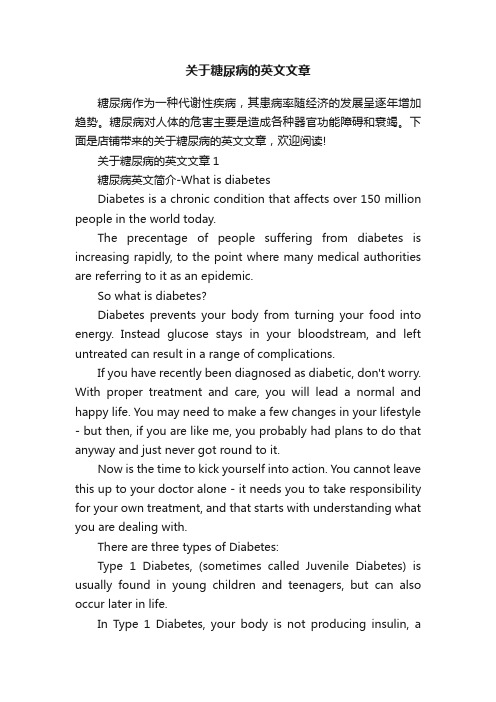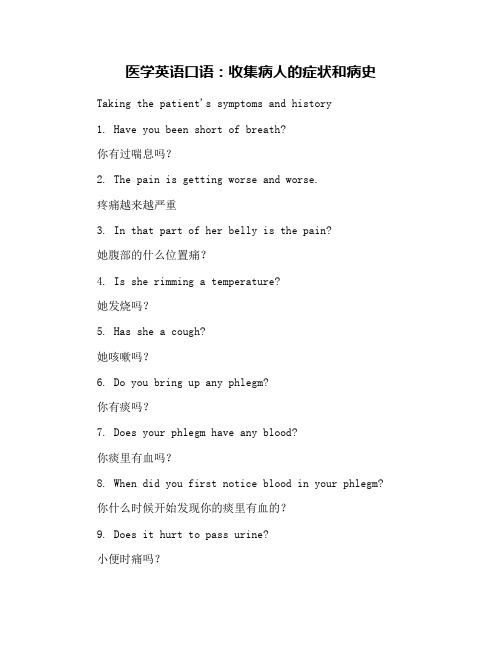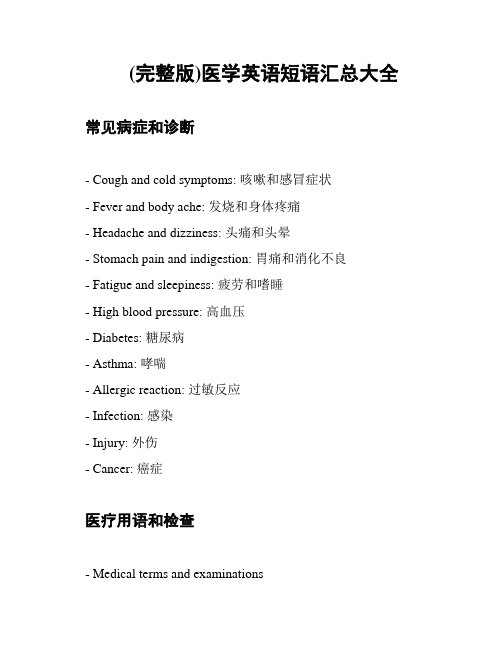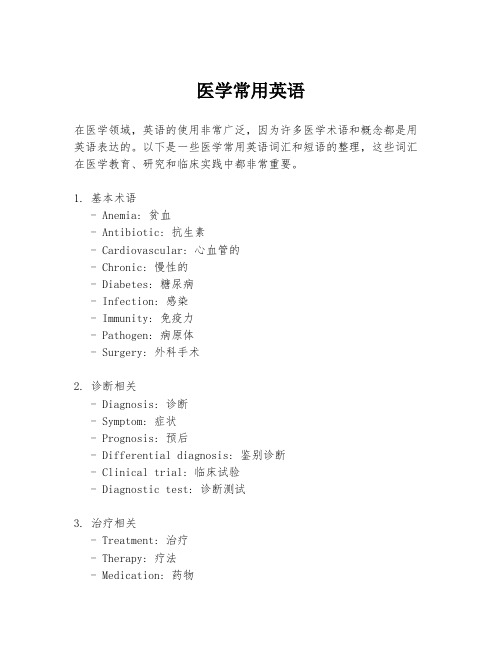Diabetes,医学英语对话
关于糖尿病的英文文章

关于糖尿病的英文文章糖尿病作为一种代谢性疾病,其患病率随经济的发展呈逐年增加趋势。
糖尿病对人体的危害主要是造成各种器官功能障碍和衰竭。
下面是店铺带来的关于糖尿病的英文文章,欢迎阅读!关于糖尿病的英文文章1糖尿病英文简介-What is diabetesDiabetes is a chronic condition that affects over 150 million people in the world today.The precentage of people suffering from diabetes is increasing rapidly, to the point where many medical authorities are referring to it as an epidemic.So what is diabetes?Diabetes prevents your body from turning your food into energy. Instead glucose stays in your bloodstream, and left untreated can result in a range of complications.If you have recently been diagnosed as diabetic, don't worry. With proper treatment and care, you will lead a normal and happy life. You may need to make a few changes in your lifestyle - but then, if you are like me, you probably had plans to do that anyway and just never got round to it.Now is the time to kick yourself into action. You cannot leave this up to your doctor alone - it needs you to take responsibility for your own treatment, and that starts with understanding what you are dealing with.There are three types of Diabetes:Type 1 Diabetes, (sometimes called Juvenile Diabetes) is usually found in young children and teenagers, but can also occur later in life.In Type 1 Diabetes, your body is not producing insulin, ahormone needed to convert blood sugar into energy. Normally this hormone is produced by cells in your pancreas, but for some reason this is not happening as it should.As the glucose in your blood can't be converted into energy and absorbed by your cells, it builds up causing high blood sugar.Left untreated, high blood sugar can cause serious long-term health problems.The normal treatment for people with type 1 diabetes is daily injections of insulin which keeps the blood sugar level within normal ranges.Finding out you have diabetes can be upsetting, but it should not prevent you from living a long and happy life.If you think this condition will prevent you leading an active life, consider Sir Steve Redgrave, one of the World's greatest Olympic athletes.Sir Steve battled type 1 diabetes to win his record-breaking fifth Olympic Gold medal at the Sydney games in the coxless fours rowing event!Type 2 diabetes (sometimes called mature onset diabetes) is the most common form of diabetes.As with Type 1 Diabetes, the problem is related to insulin, a hormone needed to convert sugar into energy.With Type 2 diabetes your body might be producing too little insulin, or it might not be reacting to the insulin correctly. Either way, the end result is that glucose builds up in the bloodstream instead of going into the cells. Left untreated, high blood sugar can cause serious long-term health problems.Type 2 diabetes usually appears later in life, often between the ages of 35-45 years. As it often develops slowly, many people may not recognise the symptoms, and may have diabeteswithout knowing it.If you have recently been diagnosed with type 2 diabetes, you are one of the lucky ones. Many people have diabetes without knowing it, and are at much greater risk of long term medical complications.Finding out you have diabetes can be upsetting, but it should not prevent you from living a long and happy life. You may need to make a few changes in your lifestyle, but these changes are also good advice for non-diabetics, so probably a good idea anyway.Gestational diabetes is a type of diabetes, that is only suffered by pregnant women.In Gestational diabetes, a woman’s blood sugar is hig her than normal because of the other hormones pridcued during preganancy interfere with the insulin that is produced naturally.Gestational diabetes usually becomes apparent during the 24th to 28th weeks of pregnancy, and, in most cases, disappears of its own accord once the baby is born.Women with gestational diabetes usually do NOT have an increased risk of having a baby with birth defects.Generally, sufferers of gestational diabetes have normal blood sugar levels during the critical first stages of the preganancy.Whilst there can be complications caused by gestational diabetes, these can usually be managed by careful attention to nutrition and blood sugar levels.Approximately 3 to 5 percent of all pregnant women in the developed world suffer from gestational diabetes.关于糖尿病的英文文章2医学英语糖尿病专业词汇A1C –Hemoglobin A1c 醣化血色素A-II receptor antagonist/blockers-ARA [ARB]血管张力素II 接受体拮抗剂/阻断剂A chain,insulin, 胰岛素α链Acanthosis nigrans, 皮肤棘状黑色素瘤Acarbose,一种α-葡萄苷酶抑制剂 ,Acarbose [Glucobay-Bayer] Accountability measures 质量改善度评量ACCU-Check Compact-Roche Diabetes Monitoring Kit 一种携带型血糖机Accupril --Quinapril [Acupril-Parke Davis]之商品名ACEI=ACE inhibitor 血管张力素转化酶抑制剂 [ACEI 非正式名词] ACE inhibitors 血管张力素转化酶抑制剂ACE-K煮甜甜--Acesulfame Potassium [煮甜甜—益富]一种Sweatener 甜味矫味剂Aceon--Perindopril [Aceon-Solvay] [Acertil-Servier]一种血管张力素转换酶抑制剂Acertil--Perindopril [Aceon-Solvay] [Acertil-Servier]一种血管张力素转换酶抑制剂Acesulfame Potassium =ACE-K [煮甜甜—益富]- 一种Sweatener 甜味矫味剂,Adalat--Nifedipine [Adalat-Bayer] [Adalat OROS-Bayer] 一种钙离子径路阻断剂Adalat OROS--Nifedipine[Adalat OROS-Bayer]一种钙离子径路阻断剂长效型Adhesion molecule 黏着分子与动脉硬化形成有关,可被HDL 抑制Acertil --Perinodopril [Acertil-Servier]商品名,属于ACE inhibitor用于糖尿肾病变Acetoacetate 乙酰乙酸盐乙酰醋酸Acetohexamide 口服降糖药物 Acetohexamide [Dymelor-Lilly]Acetone 丙酮Acetylsalicylic acid: [Aspirin-Bayer],乙酰水杨酸,阿司匹林Acidosis 酸血症Acipimox [Olbetam-Pharmacia] 烟碱酸类降脂剂Acromegaly肢端肥大症Action--Insulin 胰岛素之作用Actos –Pioglitazone,Insulin sensitizer胰岛素敏感度反应性增强剂新降血糖药物Actrapid Human Insulin-Novo Regular, Human insulin快速作用型人体胰岛素Acute myocardial infarction急性心肌梗塞ADA=American Diabetes Association 美国糖尿病学会Additive--Insulin胰岛素制剂之添加剂ADDQOL=Adult of Diabetes Dependent QOL成人糖尿病相应生活质量Adhesion--Insulin 胰岛素沾粘性Adrenergic blockers交感神经阻断剂Aducut--Delapril [Adecut-武田] 一种血管张力素转换酶抑制剂Adult of Diabetes Dependent QOL=ADDQOL成人糖尿病相应生活质量Adult Treatment Panel III , National Cholesterol education Program =NCEP ATP IIIAER Albumin excretion rate尿液白蛋白排出率。
医学名词第三册

医学名词第三册以下是 20 个医学名词的相关内容:**1. 心律失常(Arrhythmia)**词性:名词意思:指心脏跳动的节律不正常。
用法:常用于描述心脏疾病的症状,如“他被诊断出患有心律失常”。
近义词:心跳异常双语例句:哎呀,你能想象心脏像个调皮的孩子乱蹦乱跳,这就是心律失常吗?我的朋友小李最近就深受其扰,真是让人担心啊!英语:Oh dear, can you imagine the heart jumping around like a naughty kid? Thisis arrhythmia! My friend Xiao Li has been bothered by it recently. It's really worrying!**2. 心肌梗死(Myocardial Infarction)**词性:名词意思:由于冠状动脉阻塞,导致心肌缺血坏死。
用法:在医学诊断和讨论心血管疾病时常用,例如“这位患者的心肌梗死面积较大”。
近义词:心梗双语例句:这心肌梗死就像是一场突然的风暴袭击了心脏,多可怕呀!隔壁的王大爷就遭遇了这个,全家都乱了套。
英语:This myocardial infarction is like a sudden storm hitting the heart. How terrifying! The old man Mr. Wang next door suffered from this, and the whole family was in a mess.**3. 高血压(Hypertension)**词性:名词意思:血压持续高于正常水平。
用法:常作为疾病名称,如“他一直被高血压困扰”。
近义词:血压过高双语例句:高血压就像个潜伏的恶魔,慢慢侵蚀着健康,你难道不害怕吗?我爸自从得了这病,饮食都得小心翼翼。
英语:Hypertension is like a lurking devil, slowly eroding health. Aren't you afraid? Since my dad got this disease, he has to be very careful with his diet.**4. 糖尿病(Diabetes Mellitus)**词性:名词意思:一种代谢紊乱疾病,特征是血糖水平升高。
医学英语口语对话中英对照

P: Good morning, doctor.D: Good morning, please sit down.What seems to be the matter? P: I think I might have caught a cold.D: How long have you been sick? P: For two days.D: What symptoms do you have? P: I have a runny nose and I ache all over.D: What was the discharge like? P: Watery.D: Is it the same today?P: No, it is yellow and thicker today. D: Do you have a fever?P: I haven't taken my temperature yet, but I feel feverish.D: Let me take your temperature. It will take 10 minutes. ... Yes, youdo have a fever. Were youexposed to cold temperatures? P: Yes, the day before yesterday when I went to work, theweather was warm so I didn'twear extra clothes. In theevening the temperaturedropped down rapidly. On theway home I felt very cold. Afterarriving home I began to sneeze.When I got out of bed the nextmorning my nose was stuffy andrunning.D: Do you have a cough?P: I just started coughing today.D: Do you have phlegm?P: Yes, but not much.D: What color is it?P: Pale yellow. 参考译文病人:早上好,医生。
高血压、糖尿病等医学专业英语重点词汇

高血压、糖尿病等医学专业英语重点词汇Hypertension, also known as high blood pressure, is a common medical condition that affects millions of people worldwide. It is often referred to as a "silent killer" because it often has no symptoms until it causes serious health complications such as heart disease, stroke, or kidney damage. Understanding the key medical terms related to hypertension and its common comorbidity, diabetes, is essential for healthcare professionals to effectively diagnose and manage these conditions. In this article, we will explore some important medical vocabulary related to hypertension and diabetes.1. Hypertension:- Blood pressure: The force of blood against the walls of the arteries as the heart pumps blood.- Systolic blood pressure: The top number in a blood pressure reading, which indicates the pressure in the arteries when the heart beats.- Diastolic blood pressure: The bottom number in a blood pressure reading, which indicates the pressure in the arteries when the heart is at rest.- Hypertension: High blood pressure, defined as a systolic blood pressure of 140 mmHg or higher and/or a diastolic blood pressure of 90 mmHg or higher.- Prehypertension: Blood pressure readings that are higher than normal but not high enough to be diagnosed as hypertension.2. Diabetes:- Diabetes mellitus: A group of metabolic disorders characterized by high blood sugar levels over a prolonged period.- Type 1 diabetes: An autoimmune condition in which the body does not produce insulin, requiring lifelong insulin therapy.- Type 2 diabetes: A condition in which the body becomes resistant to insulin or does not produce enough insulin, often linked to obesity and lifestyle factors.- Gestational diabetes: High blood sugar levels that develop during pregnancy and usually resolve after childbirth.- Hyperglycemia: Elevated blood sugar levels.- Hypoglycemia: Low blood sugar levels, which can be a side effect of diabetes medications.3. Comorbidity:- Comorbidity: The presence of two or more chronic conditions in a person, such as hypertension and diabetes.- Metabolic syndrome: A cluster of conditions that increase the risk of heart disease, stroke, and type 2 diabetes, including obesity, high blood pressure, high blood sugar, and abnormal cholesterol levels.- Cardiovascular disease: A group of disorders of the heart and blood vessels, including coronary artery disease, hypertension, and heart failure.4. Treatment and Management:- Antihypertensive medications: Drugs used to lower blood pressure, such as ACE inhibitors, beta-blockers, calcium channel blockers, and diuretics.- Insulin therapy: Treatment for diabetes that involves injecting insulin to regulate blood sugar levels.- Lifestyle modifications: Changes in diet, exercise, and stress management to improve blood pressure and blood sugar control.- Blood glucose monitoring: Regular testing of blood sugar levels to assess diabetes control and adjust treatment as needed.In conclusion, understanding the key medical terms related to hypertension, diabetes, and their comorbidity is essential for healthcare professionals to provide effective care for patients with these conditions. By improving knowledge of these terms and concepts, healthcare providers can better diagnose, treat, and manage hypertension and diabetes to improve patient outcomes and quality of life.。
关于医患的英语口语对话

【导语】⽇常英语⼝语对话对话可以是⽣活中任意场景,都可以变成学习英语⼝语的素材,⽇常英语⼝语学习可以帮助基础较差的⼈进⾏简单的英语⼝语交流。
下⾯就由来说说医患的英语⼝语对话,⼤家千万别错过。
【篇⼀】医患的英语⼝语对话 I'd like to ask you about your past medical history. 我想询问⼀下你的病史。
Can you tell me whether you have had any childhood diseases, 你能告诉我你⼩时候得过什么病吗, for example chickenpox, measles, mumps or rubella? ⽐如⽔痘,⿇疹,流⾏性腮腺炎或者风疹? When I was small, I had measles, chickenpox and whooping cough, but I don't think I ever had rubella. ⼩时候得过⿇疹,⽔痘和百⽇咳,但是不记得得过风疹。
Have you ever been hospitalized for anything, or have you ever had an operation? 因为⽣什么病住过院吗?或者说做过⼿术吗? Well, I had my tonsils taken out when I was a child. 嗯,⼩时候做过扁桃体切除。
Have you had any major health problems since then? 从那以后有过什么⼤的健康问题吗? Yes, I have diabetes. 是的,我有糖尿病。
When were you first diagnosed with diabetes? 第⼀次诊断出糖尿病是什么时候? What were your symptoms? 有什么症状? I was diagnosed when I turned 14. I was always thirsty, tired and depressed. 我14岁的时候被诊断出糖尿病,总是感到⼝渴,疲劳,情绪低落。
医学英语口语:收集病人的症状和病史

医学英语口语:收集病人的症状和病史Taking the patient's symptoms and history1. Have you been short of breath?你有过喘息吗?2. The pain is getting worse and worse.疼痛越来越严重3. In that part of her belly is the pain?她腹部的什么位置痛?4. Is she rimming a temperature?她发烧吗?5. Has she a cough?她咳嗽吗?6. Do you bring up any phlegm?你有痰吗?7. Does your phlegm have any blood?你痰里有血吗?8. When did you first notice blood in your phlegm?你什么时候开始发现你的痰里有血的?9. Does it hurt to pass urine?小便时痛吗?10. Is there any radiation of the pain to the back?这里的痛扩散到背部吗?11. Have you taken any medicine for the pain?你服过什么药来止痛吗?12. About how many time a day has she vomited?她一天大约呕吐几次?13. Has she been moving her bowels regularly?她的大便正常吗?14. When did the diarrhea start?腹泻是什么时候开始的?15. Do you eyelids swell?你的眼睑肿吗?16. Is this first time you have ever experienced this?这是你第一次碰到这种情况吗?17. Did you have any diseases?你以前生过什么病吗?18. Have you ever had trouble with you stomach?你的胃有过毛病吗?19. Have you been with anyone who has a cold?你与感冒的人接触过吗?20. Does any in your family suffer from hypertension?你家里有人患高血压吗?21. Have you been to a doctor recently?你最近看过医生吗?22. Have you had any operations in the past?你过去做过手术吗?23. Are you allergic to anything?你对什么过敏吗?24. When was your last period?你最近一次例假是在什么时候?25. Have you been drinking at all?你是不是一直嗜酒26. Do you smoke?你抽烟吗?27. Have you lost any weight recently?你近来体重减轻了吗?28. Have you had your heart tested this year?你今年检查过心脏吗?29. Have you ever had diabetes?你患过糖尿病吗30. Did you have the history of dyspnea?你有过呼吸困难的病史吗?。
(完整版)医学英语短语汇总大全

(完整版)医学英语短语汇总大全常见病症和诊断- Cough and cold symptoms: 咳嗽和感冒症状- Fever and body ache: 发烧和身体疼痛- Headache and dizziness: 头痛和头晕- Stomach pain and indigestion: 胃痛和消化不良- Fatigue and sleepiness: 疲劳和嗜睡- High blood pressure: 高血压- Diabetes: 糖尿病- Asthma: 哮喘- Allergic reaction: 过敏反应- Infection: 感染- Injury: 外伤- Cancer: 癌症医疗用语和检查- Medical terms and examinations- General examination: 一般检查- Blood test: 血液检查- Urine test: 尿液检查- X-ray: X射线- CT scan: CT扫描- MRI scan: 磁共振扫描- Ultrasound: 超声波- Biopsy: 活检- Surgery: 手术- Anesthesia: 麻醉- Prescription: 处方- Medication: 药物- Rehabilitation: 康复医疗设施和医护人员- Medical facilities and healthcare professionals - Hospital: 医院- Clinic: 诊所- Pharmacy: 药店- Emergency room: 急诊室- Nurse: 护士- Doctor: 医生- Surgeon: 外科医生- Specialist: 专科医生- Therapist: 理疗师- Radiologist: 放射科医生- Pharmacist: 药剂师常用医学英语短语- How can I help you today?: 今天我能帮您什么?- What are your symptoms?: 您有什么症状?- Do you have any allergies?: 您有任何过敏反应吗?- Please lie down on the examination table: 请躺在检查台上- Take a deep breath: 深呼吸- Where does it hurt?: 有什么地方疼吗?- We need to run some tests: 我们需要进行一些测试- It's a routine procedure: 这是例行程序- Your prescription will be ready in 20 minutes: 您的处方将于20分钟后准备好- Take this medication with food: 用饭后服用这个药物- Follow-up appointment: 复诊预约- It's important to rest and stay hydrated: 休息和保持水分很重要急诊情况和紧急求助- Emergency situations and seeking urgent help- Call an ambulance: 拨打救护车- I'm having chest pain: 我胸口疼- I can't breathe: 我无法呼吸- I'm feeling dizzy and lightheaded: 我感到头晕和眩晕- I think I broke my arm: 我觉得我骨折了- My child has a high fever: 我的孩子发高烧了- My friend is unconscious: 我的朋友失去意识了- Please help me, I've been in an accident: 求救,我发生了事故以上是医学英语短语汇总的一些常见内容,希望对你有所帮助。
医学常用英语

医学常用英语在医学领域,英语的使用非常广泛,因为许多医学术语和概念都是用英语表达的。
以下是一些医学常用英语词汇和短语的整理,这些词汇在医学教育、研究和临床实践中都非常重要。
1. 基本术语- Anemia: 贫血- Antibiotic: 抗生素- Cardiovascular: 心血管的- Chronic: 慢性的- Diabetes: 糖尿病- Infection: 感染- Immunity: 免疫力- Pathogen: 病原体- Surgery: 外科手术2. 诊断相关- Diagnosis: 诊断- Symptom: 症状- Prognosis: 预后- Differential diagnosis: 鉴别诊断- Clinical trial: 临床试验- Diagnostic test: 诊断测试3. 治疗相关- Treatment: 治疗- Therapy: 疗法- Medication: 药物- Prescription: 处方- Dosage: 剂量- Side effect: 副作用4. 医学设备和工具- Stethoscope: 听诊器- Syringe: 注射器- Scalpel: 手术刀- X-ray: X光- MRI: 磁共振成像- ECG: 心电图5. 医学专业和角色- Physician: 医生- Surgeon: 外科医生- Nurse: 护士- Pharmacist: 药剂师- Radiologist: 放射科医生 - Pathologist: 病理学家6. 医学研究- Research: 研究- Hypothesis: 假设- Clinical study: 临床研究 - Epidemiology: 流行病学 - Biomedical: 生物医学- Pharmacology: 药理学7. 医疗保健系统- Healthcare: 医疗保健- Hospital: 医院- Clinic: 诊所- Insurance: 保险- Primary care: 初级保健- Specialist: 专科医生8. 医学伦理- Ethics: 伦理- Consent: 同意- Confidentiality: 保密- Malpractice: 医疗事故- Informed consent: 知情同意9. 医学教育- Curriculum: 课程- Lecture: 讲座- Seminar: 研讨会- Internship: 实习- Residency: 住院医师10. 公共卫生- Public health: 公共卫生- Epidemic: 流行病- Pandemic: 大流行- Vaccination: 疫苗接种- Hygiene: 卫生这些词汇和短语是医学领域中的基础,对于医学生、医生、研究人员和其他医疗保健专业人员来说,掌握这些英语表达是非常重要的。
- 1、下载文档前请自行甄别文档内容的完整性,平台不提供额外的编辑、内容补充、找答案等附加服务。
- 2、"仅部分预览"的文档,不可在线预览部分如存在完整性等问题,可反馈申请退款(可完整预览的文档不适用该条件!)。
- 3、如文档侵犯您的权益,请联系客服反馈,我们会尽快为您处理(人工客服工作时间:9:00-18:30)。
Diabetes
Patient: Recently I’ve been feeling very thirsty and passing a lot of urine. Is there anything wrong with me?
最近我总觉得口渴和尿量很多。
是有了什么毛病吧?
Doctor: How is your appetite? How do you feel otherwise?
你的胃口怎么样?一般健康状况好吗?
Patient: I’ve lost weight despite my good appetite, and I feel weak all the time.
尽管我的食欲很好,我的体重还是减轻了。
我整天觉得疲劳。
Doctor: Let me examine your time. You may have diabetes.
我给你检查一下吧。
很可能你得了糖尿病。
Patient: What is that? Can it be cured?
这是什么意思?糖尿病能治愈吗?
Doctor: Diabetes is a chronic disease due to poor functioning of the pancreas. It upsets the metabolism of sugar, fat and protein. Right now, it can’t be cured, but it can be controlled so that you can enjoy life and feel well. You should stick to a special diet and avoid sugar and sweet.
糖尿病是一种慢性病,因胰腺功能不全而起。
它使糖、脂肪和蛋白质的代谢发生异常。
目前还没有治愈方法,但是可以被控制。
因此你能生活得很愉快。
你应该坚持控制饮食,不吃糖和甜食。
Patient: Can I smoke?
我能吸烟吗?
Doctor: Smoking is harmful to anyone’s health. Better give it up.
吸烟对任何人都是有害的。
我劝你戒烟。
Patient: Can I drink alcohol?
我能饮酒吗?
Doctor: In moderation, yes. As you know alcohol contains calories and must be counted in your meal plan.
可适当喝一点。
你知道酒精能增加热卡,因此必须计算在你的食谱之内。
Patient: How can I keep to a good diet?
我怎样才能保持一个良好的饮食方案呢?
Doctor: You should learn as much as you can about diabetes, have you urine tested regularly, stick to your diet, take your medicine and have some regular exercise. Then you can live a full, useful and meaningful life.
你应当尽量学习一些有关糖尿病的知识,定期检查你的小便。
坚持食谱中的规定,按时服药,要有定量地运动。
这样你就能生活得美满、有益和有意义。
